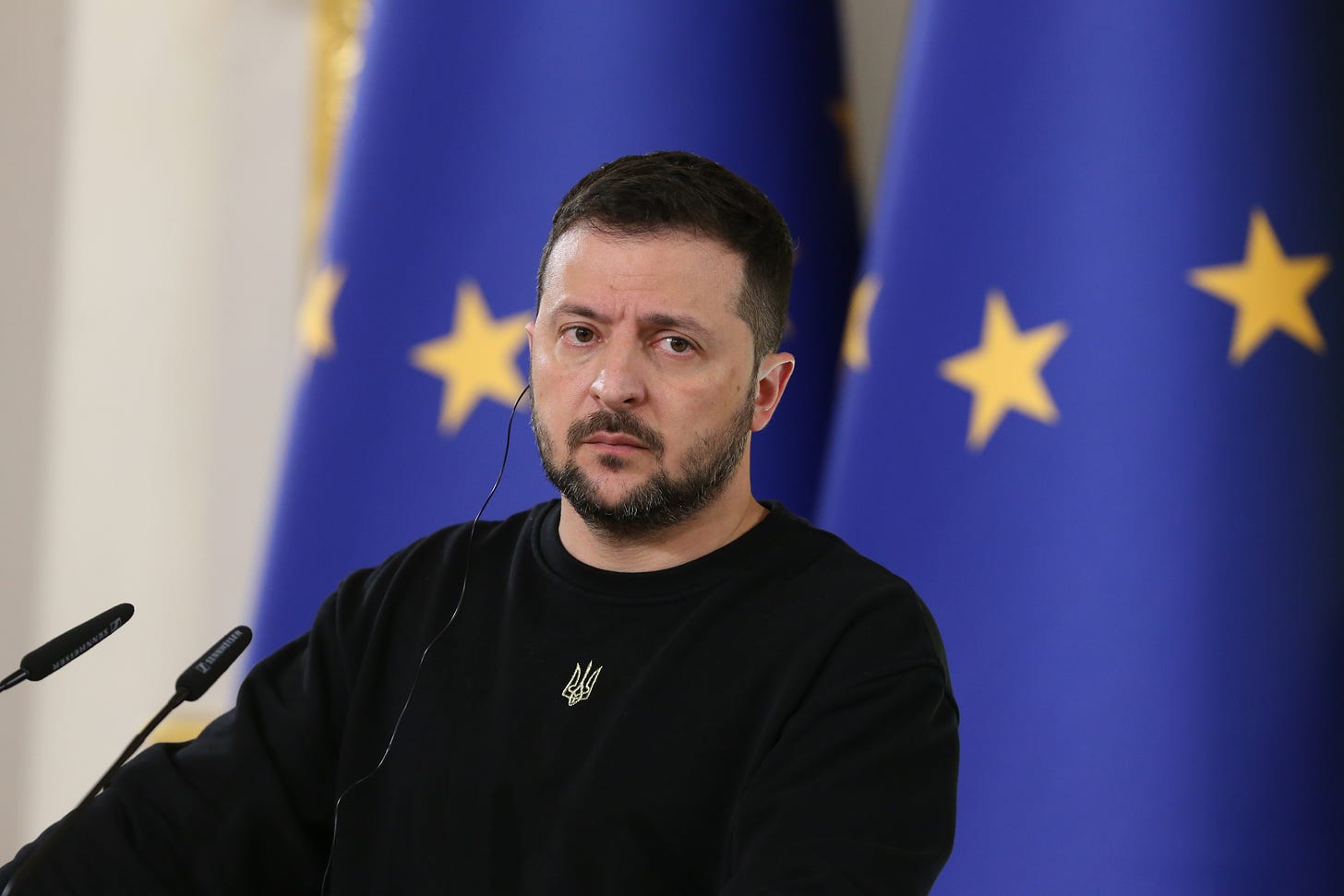
America First Means Europe Alone
If the United States withdraws, Ukraine will be the continent’s problem.

IN A MATTER OF WEEKS, Donald Trump’s policies on Ukraine will test Europe in ways that the continent is ill-positioned to handle. The consequences may be catastrophic.
Russia’s full-scale invasion has prompted the opening of EU accession negotiations with Ukraine, a major breakthrough. The war has also led to an unprecedented surge in military and non-military assistance, with countries such as Germany breaking their pacifistic taboos. Notwithstanding their aversion to large-scale, uncontrolled immigration, Poland and other countries have opened their doors to millions of Ukrainian refugees. In short, the EU’s commitment to Ukraine and its European future is an article of faith in Brussels. Take it away and it will be hard for Europeans to act with much credibility on any foreign policy subject.
Of course, there have been ups and downs to Europe’s love affair with Ukraine, from controversies over Ukrainian grain exports to the growing calls for a negotiated settlement to the war or Ukraine’s “Finlandization.”It is striking, however, that even explicitly pro-Russian governments, such as Slovakia and Hungary, have lent nominal support to Ukraine’s progress on its European path.
Things are about to change. Trump may soon impose a deal on Ukraine, or at least try to. If he’s successful, he may force Ukraine to hand over a large part of its territory to Russia in exchange for very little. NATO membership for Ukraine will be taken off the table. There will likely be no additional American support for Ukraine, military, financial, or otherwise. If Europe does nothing, Russia will be, at worst, given a free hand to do to Ukraine whatever it can; at worst, it will be given a respite to regroup, rearm, and continue the war again whenever it thinks it has the advantage.
If Europeans want a free Ukraine to succeed on its journey to the EU, they will have to do the heavy lifting themselves, without strategic guidance or other support from Washington. Indeed, if Tulsi Gabbard becomes director of national intelligence, it might behoove the Europeans to avoid the United States government whenever possible. Most urgently, Europeans would have to deploy thousands, and possibly tens of thousands, of European troops along the future line of contact.
Deterring the Russians could be quite difficult. With the United States withdrawn, the UK and France are the two remaining nuclear powers in NATO—for now—at least theoretically capable of deterring Russia. (They maintain completely separate nuclear deterrents, including command and control, which complicates the Russian’s escalation decisions.) In theory, then, a tripwire force of British and French troops along the Ukrainian-Russian line of contact could be enough to deter a Russian attack. But the Russians excel at hiding their hands behind puppet groups like the former Wagner Group and the formerly “autonomous” Donetsk and Luhansk People’s Republicans, not to mention organized criminal groups and militias. How would the British and French—or any other Europeans—react to an attack on a tripwire force by “Russian-linked” militants? The safer policy would be to have a much larger European force in Ukraine, one capable of fighting. That will be complicated, politically uncomfortable, and expensive.
Europeans will also face the humiliating choice between trying to use their pitiful defense industrial base to plug the holes left by the absence of U.S. assistance, risking further delays—or to spend their taxpayers’ hard-earned Euros to buy American materiel. The first, easiest step to alleviating this tension is to transfer the $200 billion of frozen assets in Euroclear (located in Belgium) and transferring it to Ukraine, which has no compunction about buying military supplies from abroad.
Arming Ukraine and policing the peace is only the beginning of the challenge. Presumably, a Trump-dictated deal will not go down well with Ukrainian public opinion. If Ukraine is able to survive the war—an outcome too many discount, even a thousand days into the three-day “special military operation”—its political future may not be conducive to American and European interests. The already palpable sense of betrayal by America, the eventual departure of president Volodymyr Zelensky, and the rise of veterans as a major political force will contribute to a radical energy in a traumatized country that will go back to the polls after years of martial law. If the outcome of the war is anything but completely satisfactory—and how many wars end that way?—the recriminations inside Ukraine will be severe.
For all the talk of NATO, Ukraine’s EU membership is at least as threatening to the legitimacy of Putin’s regime because it offers an alternative to his tyrannical, kleptocratic regime in a country recognizable to most Russians. If Europeans want to keep Ukraine on its path to the EU against Putin’s will, they will have to up their game. Continuing with accession talks and expecting Ukraine to make progress is not enough—that playbook has brought the EU’s enlargements in Western Balkans to a standstill.
In addition to an army of diplomats on the ground and tens of billions of Euros in support, a heroic effort will be needed to anchor critical factions of Ukrainian society with the EU. It is time, in addition to the technocratic exercise of accession talks, to bring Ukrainian students into the Erasmus program, to develop EU-run programs allowing veterans to build human capital and seize economic opportunities, and to let Ukrainian farmers export their produce to the EU—including grain.
The alternative is a failed state and possibly a Russian fiefdom at the EU’s doorstep. That means millions of additional refugees and the possibility of Russian tanks peeking at border crossings from the Barents Sea in the north to the Danube Delta in the south. Some Europeans already understand what’s at stake. The rest should catch up quickly.
















